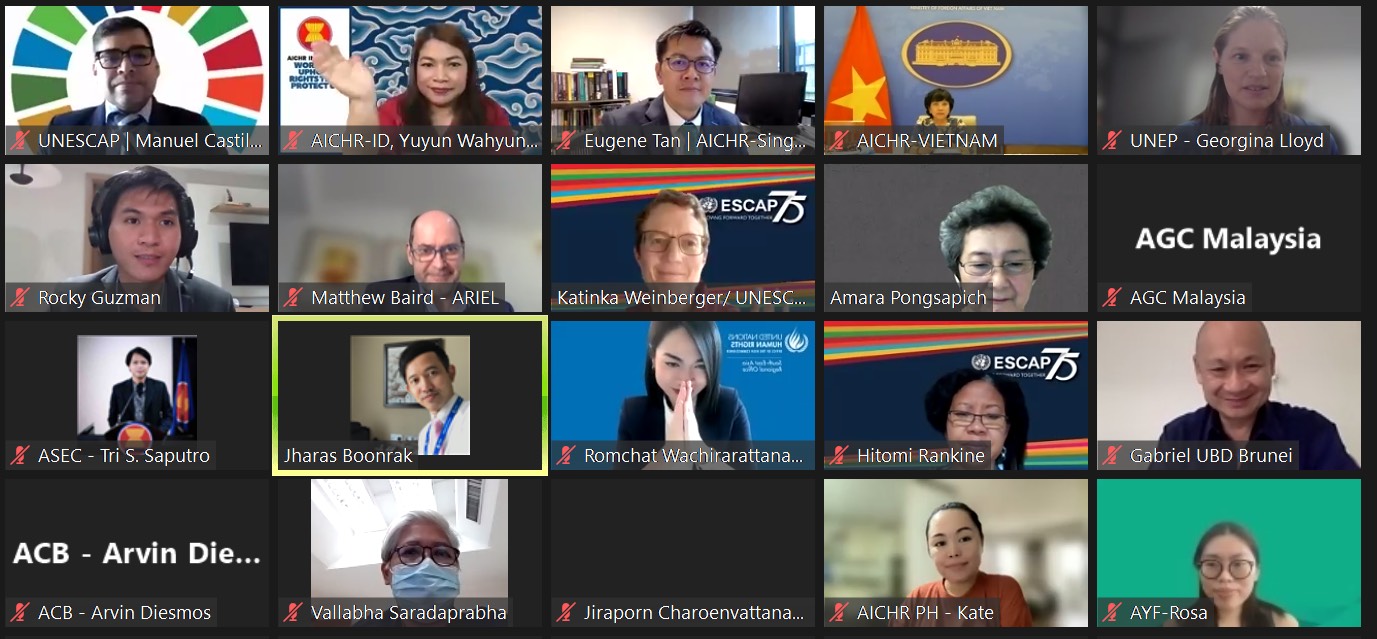
AICHR, UN discuss milestones towards a regional instrument on environmental rights in ASEAN

BANGKOK, 27 June 2022 – The ASEAN Intergovernmental Commission on Human Rights (AICHR), in collaboration with United Nations Environment Programme (UNEP), Office of the High Commissioner for Human Rights (OHCHR), and United Nations Economic and Social Commission for Asia and the Pacific (UNESCAP), conducted the “Inception Workshop for Preparation of a Work Plan to Develop a Regional Declaration on Environmental Rights in ASEAN,” on 16 June, via video conference.
Prescribed within Article 28 of the ASEAN Human Rights Declaration, ASEAN Member States pledged to respect everyone’s right to a safe, clean and sustainable environment. As the regional human rights body, the AICHR has led the work on linkages between human rights and the environment since 2014.
In her opening remarks, Prof. Dr. Amara Pongsapich, Representative of Thailand to the AICHR reiterated AICHR’s commitment to the promotion and protection of human rights in ASEAN region. The body realises the importance of the cross pillar and cross sectoral collaboration within the three communities as encouraged by the ASEAN Community Vision 2025.
She thanked the Representative of the Chair of the ASEAN Senior Officials on Environment (ASOEN) and representatives of ASEAN sectoral bodies for attending the workshop. About 50 representatives from ASEAN Secretariat, ASEAN Sectoral Bodies, Civil Society Organisations, United Nations agencies and academic institutions were in attendance.
The one-day programme included presentation of the work undertaken to date by AICHR on human rights and the environment and introduced the process towards the formation of an ASEAN cross-sectoral working group and the milestones of a regional declaration on environmental rights in ASEAN.
International experts on environmental law and policy provided background on the principles and framework on environmental procedural and access rights, elements of a declaration on environmental rights and relevant implications to ASEAN.
Among others, Carlos de Miguel from UNECLAC exchanged practical lesson-learned in realising the Regional Agreement on Access to Information, Public Participation and Justice in Environmental Matters in Latin America and the Caribbean, also known as Escazu Agreement.
Youth representatives and academics also joined AICHR Representatives in the discussion of relevant topics, including the achievement of rule of law at the regional level, protection of environmental rights defenders, and the involvement of civil society and vulnerable groups in the making process of a regional instrument on environmental rights.
This collaboration with the UN partners reaffirmed AICHR’s commitment to human rights and the environment as elaborated in the second adopted ASEAN-UN Plan of Action (2021-2025) and the AICHR Five-Year Work Plan 2021-2025, included within Priority Areas which provide for promoting mechanisms to coordinate and undertake consultations on linkages between human rights and the environment generally, and to explore initiatives to further integrate human rights-based approaches to environmental policymaking and protection.
Participants of the Inception Workshop commended on AICHR’s progress in working with the UN partners and stakeholders to achieve further steps towards the regional declaration. To that end, there will be two follow-up meetings, one on modalities of work to consider terms of reference and membership of the working group and work plan, and another on substantive elements of a draft declaration on environmental rights. They are planned for September and November this year respectively.
At AICHR Workshop on Human Rights, the Environment and Climate Change held in June 2021, the meeting considered findings from several experts on the feasibility of establishing a regional framework on environmental access right. The meeting recommended that progress be made towards exploring a regional declaration to include the right of access to environmental information and the right to participate and access to remedies in environmental matters.
